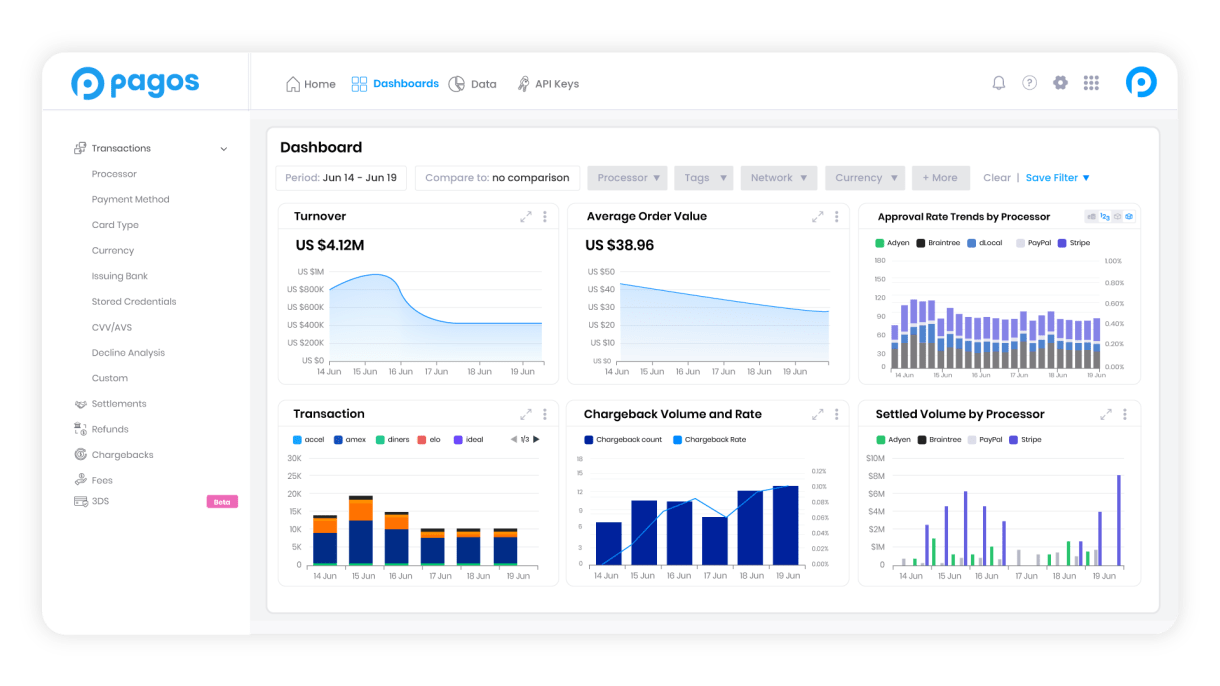With global digital payments revenue expected to reach $14.79 trillion by 2027, payment infrastructure has arguably never been more critical. But at the same time the tech is becoming essential, the costs and complexities associated with it are increasing. One recent survey shows that merchants’ satisfaction with their payment processors has declined massively, particularly when major technical hurdles arise.
Seeking to find solutions to these problems, Klas Bäck, Albert Drouart and Dan Blomberg founded Pagos, a “payment intelligence” infrastructure startup. Made up of payment experts with backgrounds from Braintree, PayPal and Stripe, Pagos turns disparate digital payments data into actionable insights without requiring customers to change their payment processors.
CEO Bäck and Drouart held senior leadership positions at Braintree/Venmo and PayPal over the last eight to nine years; Braintree/Venmo was acquired by PayPal in September 2013. Blomberg, for his part, has launched seven startups and sold five over the last two decades.
“Payment processing is fundamental to customer relationships, revenue and a business’s bottom line, but is getting more and more complex to manage well,” Bäck told TechCrunch via email. “Most companies don’t have the tools, data, or knowledge to develop or execute on an effective payment strategy; even those that do often leave significant opportunities on the table. Pagos was founded on the principle that almost all companies need help to be more data driven around their payment execution.”
Payments infrastructure vendors aren’t exactly a dime a dozen, but there’s a growing amount chasing after the massive market opportunity. Streamline, headquartered in San Francisco, recently raised $4 million for its business-to-business-focused payments product suite. Kushki is a much larger player — the Ecuadorian payments infrastructure startup landed $100 million last year at a $1.5 billion valuation.
So what does Pagos bring to the table? Bäck claims that it uniquely allows companies to stream and store their payments data — including commerce and fraud data — in one place. From a single dashboard, customers can visualize the data and keep track of metrics, including transaction, payment authorization and risk performance.

Pagos’ financial monitoring dashboard. Image Credits: Pagos
Pagos offers connections to payment processors such as Adyen, Chase, Braintree, PayPal, Stripe and WorldPay, as well as data ingestion APIs so that businesses can stream payments data and custom metadata into the platform.
“Our action products bring together a company’s data and provide APIs to give developers and business stakeholders in a company the ability to build more sophistication in their payment stack to address issues such as churn, risk, and cost — ask Pagos for recommendations on what credentials, where, and how to send your transactions for maximum upside,” Bäck said. “Pagos is different because we are not trying to offer new plumbing; we want them to use the collection of vendors and partners they have better, which could include changing processes and systems to address issues.”
In terms of customers, Bäck says that Pagos, whose platform has processed over a billion transaction events, is focused on companies that sell or bill their customers online as well as firms that service them, like fraud providers, payment orchestration platforms, acquirers, payment service providers, vertical software-as-a-service companies and marketplaces. Current clients include Adobe, Eventbrite, GoFundMe, Peek and Warner Bros Discover.
“Pagos allows businesses to see what’s going on inside a payments stack,” Bäck said. “Use cases include adding new payment partners and payment method, identifying optimal payment methods and routes, tracking payments and chargeback metrics and optimizing recurring billing to reduce churn.
Some investors see the value proposition. Pagos today closed a $34 million Series A round led by Arbor Ventures with participation from Infinity Ventures, Underscore VC and Point 72 Ventures. It brings the company’s total raised to $44 million, which Bäck says is being put toward funding new hires in engineering, product development and “faster customer implementation.”
“We actually weren’t seeking additional capital right now. However, we were flooded with inbound investor interest and recognized a unique opportunity to scale our customer base even faster, especially in today’s volatile economic climate,” Bäck said. “This opportunistic Series A round was substantially oversubscribed.”
As for what the future holds, Bäck says he isn’t too concerned about the challenging macroeconomic climate for startups. He avers, in fact, that the pandemic spurred a rush to e-commerce that, while since simmered down, has had lasting effects.
To Bäck’s point, the pandemic led to a measurable increase in the use of digital payments. The World Bank’s Global Findex 2021 database found that — in low and middle-income economies excluding China — over 40% of adults who made merchant in-store or online payments using a card, phone or the internet did so for the first time since the start of the pandemic.
“Backend financial infrastructure remains critical. Now more than ever, helping companies sell more and reduce their costs resonates quickly,” Bäck said. “Over the last 9-12 months, many companies have been extra focused on reducing their cost of operation. This is something Pagos is particularly well-positioned to help with — most companies can even get started without any integration work, making the return on investment extremely fast.”
Within the next year, Pagos plans to “greatly expand” the remote software, product, sales and account management teams within its 41-person workforce, Bäck says.
Pagos raises $34M as the demand for ‘payment intelligence’ rises by Kyle Wiggers originally published on TechCrunch
No comments:
Post a Comment